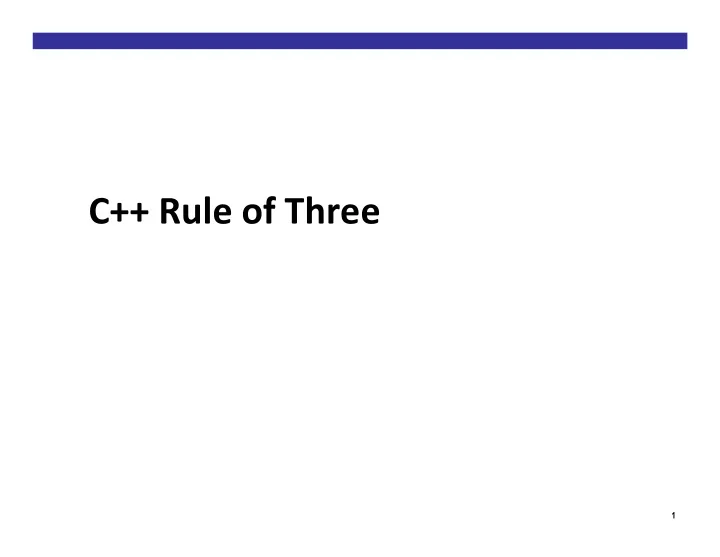

C++ ¡Rule ¡of ¡Three ¡ 1
Compiling ¡and ¡running ¡C++ ¡code ¡ � See: ¡ h"ps://courses.engr.illinois.edu/cs225/fa2017/resources/own-‑ machine/ ¡ ¡ � Mac ¡OS ¡X, ¡Linux: ¡very ¡straight-‑forward ¡ � Windows: ¡best ¡opIon ¡for ¡this ¡class ¡might ¡be ¡FastX ¡ � h"ps://it.engineering.illinois.edu/user-‑guides/remote-‑ access/connecIng-‑ews-‑linux-‑fastx ¡ 2
Compiling ¡C++ ¡ � Clang: ¡ ¡C ¡language ¡compiler ¡ � clang ¡for ¡C ¡programs ¡ � clang++ ¡for ¡C++ ¡programs ¡ � Important ¡arguments ¡/ ¡op;ons: ¡ � Names ¡of ¡the ¡C/C++ ¡source ¡files ¡(not ¡header ¡.h ¡files) ¡ � -‑std=c++0x ¡ ¡ ¡ ¡ ¡ ¡ To ¡specify ¡which ¡version ¡of ¡C++ ¡standard ¡ � -‑o ¡outpuRilename ¡ ¡ ¡ ¡ ¡ ¡ By ¡default ¡it ¡creates ¡a ¡file ¡called ¡a.out ¡ � For ¡example: ¡ � clang++ ¡-‑std=c++0x ¡main.cpp ¡number.cpp ¡-‑o ¡number ¡ 3
Makefiles ¡(and ¡build ¡scripts ¡in ¡general) ¡ � A ¡way ¡to ¡automate ¡(complex) ¡tasks ¡ � Supports ¡incremental ¡updates ¡via ¡dependences ¡ � Used ¡for ¡building ¡computer ¡programs ¡ � Consist ¡of ¡rules ¡(with ¡the ¡following ¡structure) ¡ thing_to_make: list of things that it uses commands to execute to make the thing � For ¡example: ¡ number: main.cpp number.cpp number.h clang++ -std=c++0x main.cpp number.cpp -o number ¡ 4
Makefiles, ¡cont. ¡ � Allow ¡you ¡to ¡define ¡variables ¡ EXENAME = q2 Variable ¡ ¡ Defini;ons ¡ CXX = clang++ CXXFLAGS = -std=c++0x -g -O0 -Wall -Wextra all : $(EXENAME) $(EXENAME): q2.cpp heap_int.cpp $(CXX) $(CXXFLAGS) q2.cpp heap_int.cpp -o $(EXENAME) Variable ¡Use ¡ � First ¡rule ¡is ¡the ¡default ¡rule ¡ 5
Review: ¡Copy ¡Constructors ¡ � What ¡happens ¡when ¡we ¡copy ¡an ¡object? ¡ ExpressionValue ¡myExpr(1.0); ¡ ExpressionValue ¡myOtherExpr ¡= ¡myExpr; ¡ ¡ ¡ ¡ � It ¡invokes ¡a ¡copy ¡constructor ¡ � Be ¡default, ¡it ¡does ¡a ¡bit-‑wise ¡copy ¡of ¡the ¡object ¡ � Can ¡override, ¡by ¡declaring: ¡ ExpressionValue( const ExpressionValue&); 6
Why ¡override ¡default ¡copy ¡constructor? ¡ � Generally, ¡when ¡we ¡want ¡a ¡deep ¡copy. ¡ � Shallow ¡copy: ¡ ¡bit-‑wise ¡copy ¡of ¡the ¡object ¡that ¡copies ¡any ¡ pointers/references ¡contained, ¡but ¡not ¡the ¡pointed ¡to/ referenced ¡objects ¡ � Deep ¡copy: ¡ ¡occurs ¡when ¡all ¡of ¡the ¡pointed ¡to/referenced ¡ objects ¡are ¡also ¡copied ¡ 7
Operator ¡Overloading ¡ � Unlike ¡in ¡Java, ¡in ¡C++ ¡you ¡can ¡define ¡how ¡standard ¡op ¡behave ¡ 8
Assignment ¡Operator ¡ � Type ¡&operator=(const ¡Type ¡&rhs); ¡ � Again, ¡useful ¡for ¡deep ¡copies ¡ 9
Which ¡is ¡being ¡invoked? ¡ A) Assignment ¡operator ¡ B) Copy ¡Constructor ¡ C) Default ¡Constructor ¡ D) None ¡of ¡the ¡above ¡ ExpressionValue ev1, ev2; // #1 ExpressionValue ev3 = ev2; // #2 ev3 = ev1; // #3 ¡ 10
Destructors ¡ � A ¡func;on ¡called ¡when ¡the ¡object ¡is ¡deleted ¡ � Defined ¡as: ¡~Type() ¡ � Again: ¡useful ¡when ¡the ¡object ¡contains ¡other ¡objects, ¡so ¡we ¡ can ¡delete ¡those ¡other ¡objects ¡(and ¡not ¡leak ¡memory) ¡ 11
C++ ¡Rule ¡of ¡Three ¡ � is ¡a ¡rule ¡of ¡thumb ¡that ¡if ¡a ¡class ¡defines ¡one ¡(or ¡more) ¡of ¡ the ¡following ¡it ¡should ¡probably ¡explicitly ¡define ¡all ¡three: ¡ � destructor. ¡ ¡ � copy ¡constructor. ¡ ¡ � copy ¡assignment ¡operator. ¡ 12
Recommend
More recommend